 Ivy, Angelica, Bay by C.L. Polk
Ivy, Angelica, Bay by C.L. Polk Format: ebook
Source: supplied by publisher via Hugo Packet
Formats available: ebook, emagazine
Genres: fantasy, historical fantasy
Pages: 51
Published by Tor Books on January 17, 2024
Purchasing Info: Author's Website, Publisher's Website, Amazon, Barnes & Noble, Kobo
Goodreads
When Hurston Hill is threatened by a suspiciously powerful urban development firm, Miss l'Abielle steps up to protect her community with the help of a mysterious orphaned girl in this charming follow up to "St. Valentine, St. Abigail, St. Brigid," featured on LeVar Burton Reads.
My Review:
This was intended to be my review of Ivy, Angelica, Bay as the next in my series of Hugo nominee reviews. And it will be.
Howsomever, when I looked at the author’s website I discovered something marvelous. That this novelette is the follow-up to St. Valentine, St. Abigail, St. Brigid, a short story that was published in February 2020 at Reactor Magazine, formerly known as Tor.com. Even better, the short story was read, in full, by Levar Burton on his podcast, Levar Burton Reads. (Which I highly recommend, not just this story but the whole beautiful thing!)
I loved Ivy, Angelica, Bay. I needed something short to listen to at the end of a long week. And thereby hangs the proverbial tale, so this review ended up being a bit of both.
Both of these stories are about the price of magic, which is really about that combination of being careful what you wish for because you might get it, the way that the magic ring always comes with a curse, and that having a thing may not be so pleasurable as wanting it – referring back to last Friday’s book just a bit.
 St. Valentine, St. Abigail, St. Brigid is the setup for Ivy, Angelica, Bay. The young, unnamed, first-person narrator of St. Valentine may be the adult in Ivy, or may be one of her many predecessors as the magical – and magically adopted – Miss l’Abielle. That we don’t know – although we don’t really need to – in Ivy does make me curious about how the magic at the end of that first story worked out – but that’s just my curiosity bump itching.
St. Valentine, St. Abigail, St. Brigid is the setup for Ivy, Angelica, Bay. The young, unnamed, first-person narrator of St. Valentine may be the adult in Ivy, or may be one of her many predecessors as the magical – and magically adopted – Miss l’Abielle. That we don’t know – although we don’t really need to – in Ivy does make me curious about how the magic at the end of that first story worked out – but that’s just my curiosity bump itching.
The story in St. Valentine is a coming of age and into power story. It’s also a bit of a story about selfishness – as coming of age stories are wont to be. But it also foreshadows both the narrator’s desire to keep what is hers – no matter the cost and no matter how benevolent she might be in that keeping – and the way that the magical power in these stories is maintained and passed on.
You don’t have to read or listen to St. Valentine in order to get stuck right into Ivy, but I’m glad I found it because listening to it was marvelous and it made the story I’d just finished that much deeper.
In Ivy, Angelica, Bay we get a story that reminds me a LOT of two of Leslye Penelope’s recent books, The Monsters We Defy and Daughter of the Merciful Deep, in that both are centered around protecting black communities from, let’s call it economic encroachment although that’s not all of what’s happening. The Monsters We Defy hits more of the same notes as Ivy, as both stories feature young black women as magical practitioners who protect their communities but also assist individuals who are willing to pay both a magical and a mundane price for that assistance. And that all too often the magical price is much too high.
But there’s also more than a bit of T. Kingfisher’s forthcoming A Sorceress Comes to Call in Ivy – as that turns out to be exactly what happens in both cases. The surprise is that in Ivy, there’s more than a bit of, of all surprising stories, The Velveteen Rabbit.
Escape Rating A+: Consider that rating for the overall experience as well as for all the parts that are combined into this whole. At this point I’ve read four of the six nominees for this year’s Best Novelette and I’m at the “eeny, meeny, miny, moe” point for selection and I still have two to go.
What makes these stories work, but particular for Ivy, Angelica, Bay because it has a bit more time and heft to it – also that St. Valentine has done a bit of its setup for it – is the way that it combines its elements and then tells its story through its protagonist, the current Miss l’Abielle, so that even though we don’t know her name we still feel the horns – and thorns – of all of her dilemmas.
She is charged with protecting her community – but that charge has just fallen on her shoulders fully at the death of her mother. She’s spent too much of her magical energy in recent weeks and months keeping her mother on this side of death’s door – and now the price of that keeping has come due. Maybe even past due.
And she’s a bit desperate and a lot heartsore and easily gulled by a likely story – to the point where she nearly brings about the downfall of all she holds dear. A catastrophe that is made all that much clearer to the reader as she dives into what has gone wrong and we see who will pay that price – and is already paying – if she falls. Because the community will fall with her.
Her salvation – and theirs – comes in the most unlikely form. Which is where that Velveteen Rabbit hops into the story in a way that is surprising, delightful and perfect. And still requires a price to be paid – but one that the Misses l’Abielle and their community can bear more than well enough to continue the fight for another day.

 On the Fox Roads by
On the Fox Roads by 
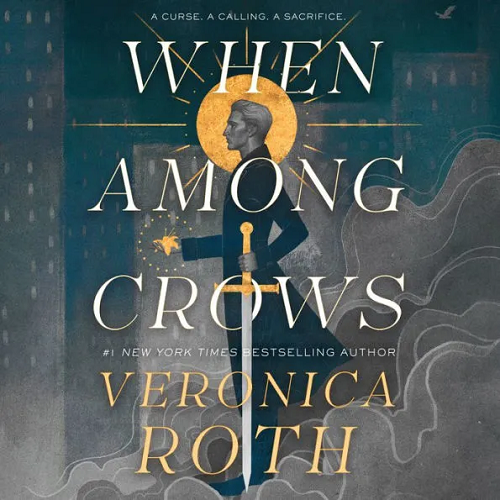 When Among Crows by
When Among Crows by  At the same time, the way this story drew in so many Slavic myths and legends that I itched for a mythopedia (I was driving, that would have had terrible consequences) reminded me, a lot and very fondly, of Neil Gaiman’s
At the same time, the way this story drew in so many Slavic myths and legends that I itched for a mythopedia (I was driving, that would have had terrible consequences) reminded me, a lot and very fondly, of Neil Gaiman’s 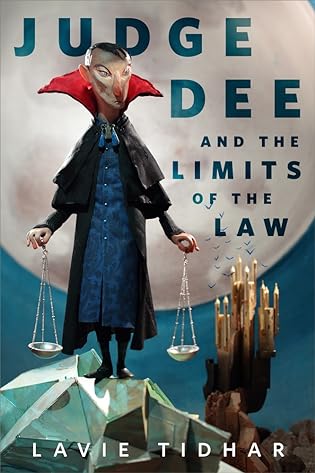 Judge Dee and the Limits of the Law (Judge Dee, #1) by
Judge Dee and the Limits of the Law (Judge Dee, #1) by 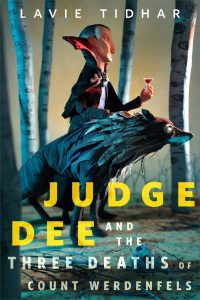 What makes the story fun – more than fun enough that I’ll be picking up the next story the next time I need something short to tide me over an overcommitted calendar – is the first person perspective of poor, put upon, Jonathan. He’s snarky, he’s both world-weary and vampire-weary, but he’s always aware of the side on which his bread is buttered – when he can get any, that is. So his commentary covers the Judge, the law he administers, his opinions and predilections, but also the companionship they provide each other.
What makes the story fun – more than fun enough that I’ll be picking up the next story the next time I need something short to tide me over an overcommitted calendar – is the first person perspective of poor, put upon, Jonathan. He’s snarky, he’s both world-weary and vampire-weary, but he’s always aware of the side on which his bread is buttered – when he can get any, that is. So his commentary covers the Judge, the law he administers, his opinions and predilections, but also the companionship they provide each other.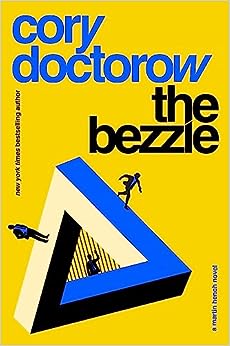 The Bezzle (Martin Hench #2) by
The Bezzle (Martin Hench #2) by 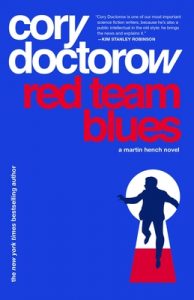 Escape Rating A: The Bezzle is a LOT of things, all of which are fascinating and make for a compelling read, but absolutely none of which are remotely science fiction, whether it is marketed as such or not. And not that SF readers won’t enjoy The Bezzle, because they certainly will and I absolutely did.
Escape Rating A: The Bezzle is a LOT of things, all of which are fascinating and make for a compelling read, but absolutely none of which are remotely science fiction, whether it is marketed as such or not. And not that SF readers won’t enjoy The Bezzle, because they certainly will and I absolutely did.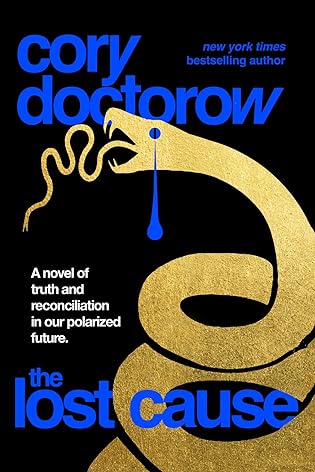 The Lost Cause by
The Lost Cause by 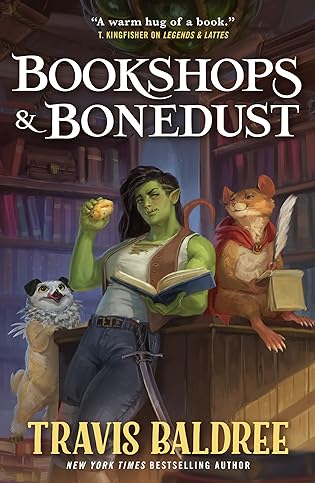 Bookshops & Bonedust (Legends & Lattes, #0) by
Bookshops & Bonedust (Legends & Lattes, #0) by 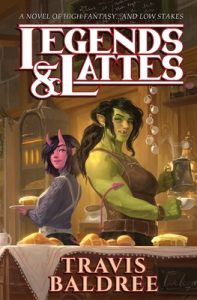 Escape Rating A+: Anyone who sunk straight into the cozy fantasy vibe of
Escape Rating A+: Anyone who sunk straight into the cozy fantasy vibe of 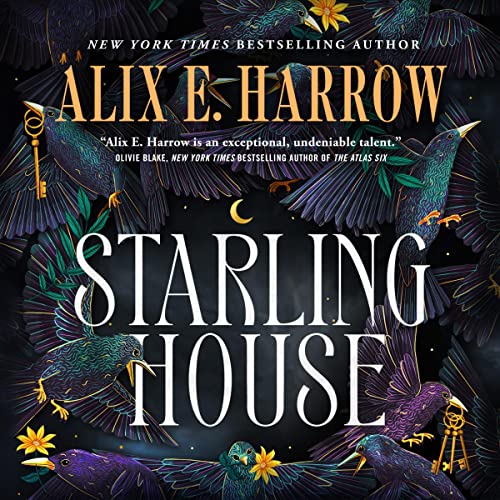 Starling House by
Starling House by 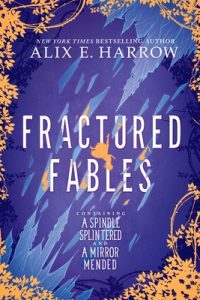 I took this journey in audio, with Natalie Naudus as the most excellent narrator. As a narrator, she seems to specialize in heroines who think that everything is all their fault and that they have to do it all alone, and her voice made me think of her other characters, Emiko Soong in
I took this journey in audio, with Natalie Naudus as the most excellent narrator. As a narrator, she seems to specialize in heroines who think that everything is all their fault and that they have to do it all alone, and her voice made me think of her other characters, Emiko Soong in 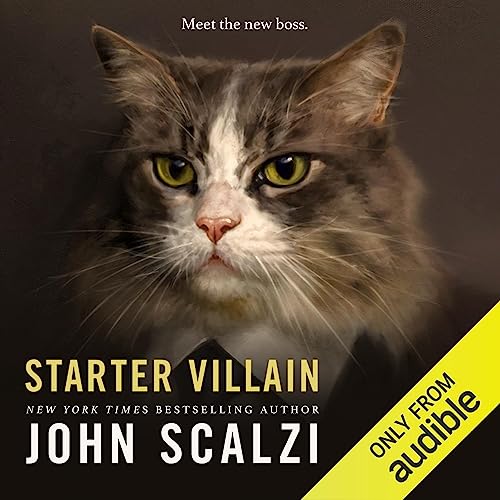 Starter Villain by
Starter Villain by 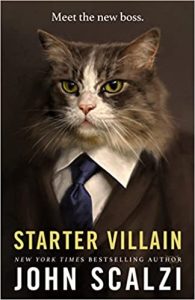 Escape Rating A: Charlie starts out Starter Villain in WAY, WAY over his head. Part of his charm is that he never loses sight of that fact. He’s always aware that he hasn’t got a clue, and isn’t likely to get one any time soon, and is secretly panicking about it every other minute. Which is a big chunk of why we like him and end up rooting for him so hard, because his inner voice is asking the same questions that a lot of us would be asking in his place.
Escape Rating A: Charlie starts out Starter Villain in WAY, WAY over his head. Part of his charm is that he never loses sight of that fact. He’s always aware that he hasn’t got a clue, and isn’t likely to get one any time soon, and is secretly panicking about it every other minute. Which is a big chunk of why we like him and end up rooting for him so hard, because his inner voice is asking the same questions that a lot of us would be asking in his place.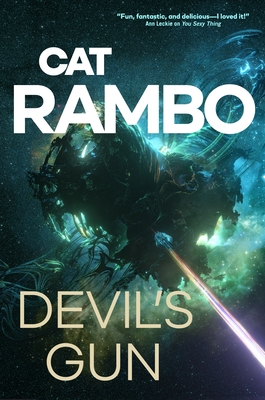 Devil's Gun (Disco Space Opera #2) by
Devil's Gun (Disco Space Opera #2) by 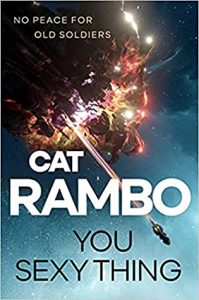 Escape Rating B: I picked this up because I enjoyed the first book in the series,
Escape Rating B: I picked this up because I enjoyed the first book in the series,